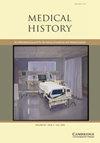Age matters: health, older people and gerohygiene in the late Soviet Union
IF 1.1
2区 哲学
Q4 HEALTH CARE SCIENCES & SERVICES
引用次数: 0
Abstract
Abstract In the late Soviet period, a great deal of research was conducted on older people’s health, with the Institute of Gerontology Academy of Medical Sciences (AMN) USSR in Kyiv spearheading a great deal of this. Of particular interest was older people’s ability to work beyond retirement age, the issue of premature ageing, as well as physical activity, diet and living conditions. Many of these interests came under the concept of ‘gerohygiene’, which also reflected the Soviet Union’s prophylactic approach to eldercare (and healthcare more generally). Discussions about older people and Soviet research on gerohygiene are important for furthering our understanding of ideas around healthy ageing and the Soviet project more generally. The Soviet, and indeed socialist, research on gerohygiene sheds light on ideas around active ageing, premature ageing and work practices for older people. It also shows that the role of old people belonged to the wider Soviet effort of contributing to the communist project and shaping society. In this article, I define and examine the broad concept of ‘gerohygiene’ and then assess how gerohygiene applied to older people’s health in relation to both physical activity and labour.年龄很重要:前苏联后期的健康、老年人和老年卫生
在苏联后期,人们对老年人的健康进行了大量的研究,位于基辅的苏联医学科学院老年学研究所(AMN)率先进行了大量的研究。特别令人感兴趣的是老年人在退休年龄后的工作能力、过早衰老问题以及身体活动、饮食和生活条件。许多这些兴趣来自“老年卫生”的概念,这也反映了苏联对老年人护理(以及更广泛的医疗保健)的预防性方法。关于老年人和苏联老年卫生研究的讨论对于我们进一步了解健康老龄化和更广泛的苏联项目的思想很重要。苏联,实际上是社会主义,对老年卫生的研究揭示了积极老龄化,过早老龄化和老年人工作实践的想法。它还表明,老年人的角色属于苏联为共产主义计划和塑造社会做出贡献的更广泛努力。在这篇文章中,我定义和检查了“老年卫生”的广泛概念,然后评估了老年卫生如何应用于老年人的身体活动和劳动健康。
本文章由计算机程序翻译,如有差异,请以英文原文为准。
求助全文
约1分钟内获得全文
求助全文
来源期刊

Medical History
医学-科学史与科学哲学
CiteScore
1.60
自引率
0.00%
发文量
25
审稿时长
>12 weeks
期刊介绍:
Medical History is a refereed journal devoted to all aspects of the history of medicine and health, with the goal of broadening and deepening the understanding of the field, in the widest sense, by historical studies of the highest quality. It is also the journal of the European Association for the History of Medicine and Health. The membership of the Editorial Board, which includes senior members of the EAHMH, reflects the commitment to the finest international standards in refereeing of submitted papers and the reviewing of books. The journal publishes in English, but welcomes submissions from scholars for whom English is not a first language; language and copy-editing assistance will be provided wherever possible.
 求助内容:
求助内容: 应助结果提醒方式:
应助结果提醒方式:


